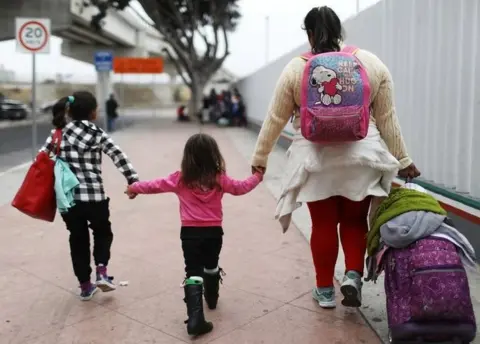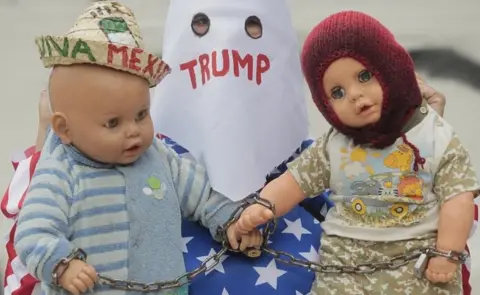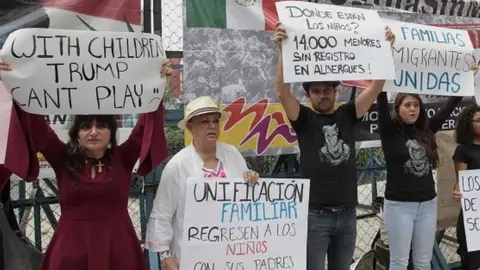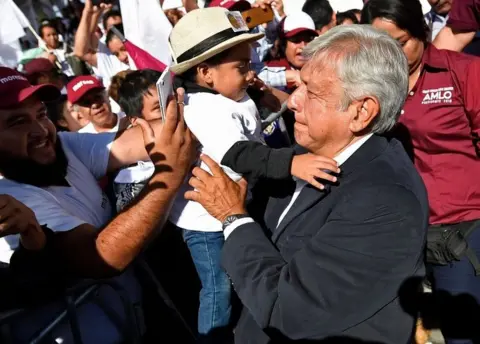Migrant children: Latin America unites in outrage
 Getty Images
Getty ImagesThe US government has separated more than 2,000 children from their parents, while it prosecutes people suspected of entering illegally from Mexico. What's the reaction been like in Latin America?
Even for an administration as craven to Washington as Guatemala's, it was an extraordinary admission.
"The Guatemalan government is respectful of US immigration policy," said the president's spokesman, Heinz Hiemann, when asked about the Trump administration's controversial practice of separating immigrant children - many of them Guatemalan - from their parents.
It would prove to be his final act in the job.
He was unceremoniously sacked the following morning with a statement clarifying that his comments "did not represent the position of President Jimmy Morales".
Amid the international outcry over the "zero-tolerance" policy - under which adults who cross the US-Mexico border face prosecution for illegal entry, meaning they are separated from their children - even the White House's closest allies in Central America abandoned them over the measure.
In fact, such was the furious reaction across Latin America that it is hard to think of a single issue which has galvanised the region in this way. Leaders from the far right to the hard left, from Brazil to Venezuela, from Honduras to Mexico, have lined up in opposition to the move.
Conservative newspaper columnists and left-wing lobbyists alike have expressed a combination of anger and disgust, adding their voices to the chorus demanding the measure be overturned.
 EPA
EPA"Family separation is intolerable," wrote Guatemala's conservative daily, Prensa Libre, in an editorial.
For many readers, that pretty much summed it up.
Even the Mexican Foreign Minister, Luis Videgaray, a politician who has been badly damaged by his close relationship with the Trump administration, called the practice "cruel and inhumane" and a "violation of their human rights".
It was further than the Mexican government had gone in some time in criticising Washington.
Mr Videgaray also gave the crisis a human face: a 10-year-old Mexican girl with Down's syndrome was separated from her mother earlier this year, he told the gathered media. He urged the Trump administration to set up a register as soon as possible to prevent minors from being lost in the system.
"I understand that every sovereign nation has the right to dictate its own laws as they see fit," Norman Quijano, president of the Legislative Assembly in El Salvador, told the BBC. "But immigration is a worldwide phenomenon - the United States itself is the product of generations of flows of immigrants."
 EPA
EPAAs an influential member of the conservative Arena Party, Mr Quijano has been a long-standing partner of the US Republican Party. He says he recognises that his "compatriots have violated US migration laws" and that this was largely a result of the "incapability of our country to help them realise their dreams here at home, in El Salvador".
But nothing could justify putting kids in cages, he adds.
The description of those heading north as solely economic migrants fails to address the asylum question which many of them raise on reaching the US border.
"It's not political asylum in the traditional sense, in that they're not persecuted for their beliefs," says Salvadoran political analyst Alberto Arene. "But being a young person in those countries today is fraught with danger because of the gangs which control their neighbourhoods."
Violence continues to plague swathes of Central America. Successive governments have mainly responded with a policy of mano dura or "iron fist" - giving the security forces free rein to engage in open warfare with the gangs in many poor neighbourhoods in the country.
"There are two Central Americas moving at two different speeds," Mr Arene argues. Countries in the south of the region - Costa Rica and Panama - enjoy more economic opportunities than those in the "Northern Triangle" - Honduras, El Salvador and Guatemala - which are "verging on failed states", he says.
"Institutions are weak, investment is low, social systems aren't working," Mr Arene adds.
 Getty Images
Getty ImagesAdd to that the extensive police repression, including widespread violations of human rights, and the asylum claims of those parents carrying their children over the border are legitimate, he argues.
The Trump administration - which has argued that splitting up families at the US-Mexico border serves as a deterrent against illegal immigration - has begun to unpick the policy since the president signed an executive order not to separate families at the border any longer.
But it has been a time of mixed messages from Washington, further alienating their neighbours to the south.
"Mexico does nothing" to stop undocumented immigrants travelling north, said Mr Trump again this week, one of his constant refrains.
Given the extent to which Mexico tightened its southern border with Guatemala at Washington's behest during the Obama administration, that won't have gone down well.
Still, the clear front-runner in Mexico's presidential election, Andres Manuel Lopez Obrador, applauded Mr Trump's reversal on the separation policy. "It's good to hear because it was a racist and inhumane measure" he said at a rally.
"It's always wise to change your mind, especially on humanitarian issues", he added, possibly with an eye on the future.
If the polls are right, he will soon become the next president of Mexico and the two men will presumably have to try to find a solution to these thorny cross-border issues.
After a particularly divisive week, which showed that even unwitting children can be thrust into the game of political brinkmanship, that just became a little harder.
